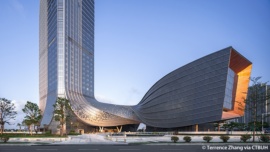The lack of social spending and services makes it more difficult for Macau to be able to retain and attract skilled workers.
This was one of the conclusions of the study Economic Structure, Social Risks and the Challenges to Social Policy in Macau, China conducted by researchers Bingqin Li and Zhonglu Zeng from the Australian National University and Macau Polytechnic Institute, respectively.
“Macaus economy also suffers from shortage of qualified labour, which would be necessary if it wants to achieve economic restructure. However, the lack of social spending and services makes the city a much less attractive place for skilled labour to settle down otherwise, the authors wrote in an article published this month in the magazine Asia & The Pacific Policy Studies.
Looking at Macau, the authors identify a dilemma faced by the Special Administrative Region despite it growing and having a low-unemployment rate. It faces, they contend, a serious threat related to the slowdown of the gaming industry.
Concerning social policies, the authors focus on two points that in their opinion would enable the government to reach the goal of diversifying the economy. They stress, however, that this would require taking a somewhat different approach from what the government has been doing.
The first point suggests the government expand coverage of the social protection system to include non-resident workers in order to retain them in the territory and to avoid social resentment, conflicts and social instability.
The second point concerns investing more in capital and infrastructure development through social spending on training, higher education and improving public infrastructure. This suggestion is aimed at preparing the human resources pool of the region to be able to give a proper answer to the demand of the new industries that will develop in Macau as the economy becomes more diversified.
Solutions not so simple If on the one hand the authors suggest the implementation of more friendly policies to retain and increase the number of non-resident workers, on the other hand they also explain that the conditions to achieve this goal are far from ideal.
“However, these days, importing more migrant workers has become increasingly unpopular politically. Local residents blame outsiders for taking their jobs and making their living costs more expensive. There have been large-scale protests by local residents to call for migration control and labour market protection, the authors point out.
This notwithstanding, Bingqin Li and Zhonglu Zeng defend that this perception, in a time when there is a shortage of labour, is driven by the frustration over the lack of investment by the government to improve living conditions in the city.
“The negative perception of the migrant contradicts the fact that there is a labour shortage. The increased social tension reflects peoples growing frustration over the lag in public spending to improve peoples livelihoods, the authors posit.
Economic
and income growth at different speeds While the overall tone of the study casts a positive light on the economic performance of Macau since the handover, it also addresses the fact that the economy has grown faster than the income growth of families in Macau.
“The average GDP [Gross Domestic Product] growth line has an increasingly bigger gap between GDP and residents income growth. This means that the economic growth has not led to income growth at the same rate, the study says. In 2001-2012, Macaus GDP increased 6.6 times, while GDP per capita increased 5.08 times. However, the medium income only increased by two times, it added.
Concerning the social needs in Macau, the researchers identify three structural problems: the concerns raised by increasing living costs, income inequality, which is perceived as a serious challenge, and the fact that disadvantaged families have not benefited from the economic development.
























